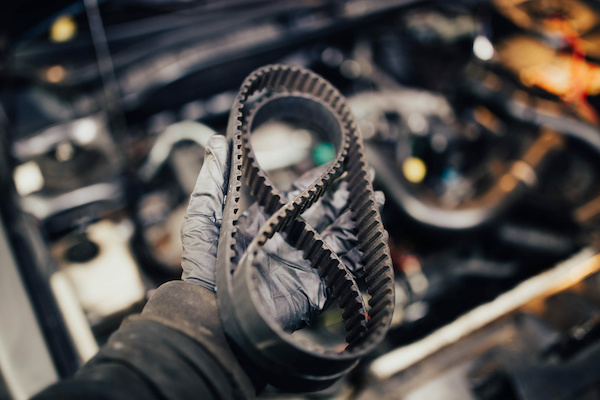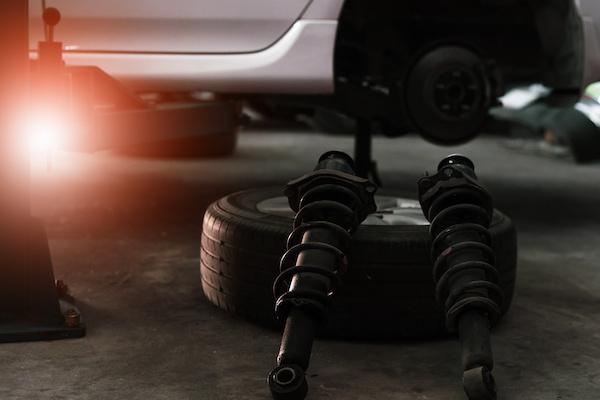Posted on 12/20/2022

The timing belt tends to be forgotten or overlooked when it comes to auto maintenance. This rubber is the part of your vehicle’s engine that synchronizes the crankshafts and camshaft rotation. At some point during your vehicle's life, you will have to change the timing belt. Most cars require a timing belt replacement every 75,000-100,000 miles. What About Timing Chains? Some cars have timing chains instead of timing belts. It serves the same purpose, but the component is made of steel instead. Timing chains can still stretch or break, but they wear longer than timing belts. Your engine parts, including the timing belt, must work in perfect synchrony to ensure seamless engine operation. If the timing belt breaks on you, it certainly will damage the internal parts of the engine. That is why it is essential for you to know how to spot early signs of timing belt failure. It can save you tons of money on unnecessary engine repairs. Here are some of ... read more
Posted on 11/20/2022

Shopping for a car, SUV, or truck can be difficult – it takes time and research. Say you come across a pre-owned car with a great price; what’s next? You should ensure your vehicle is in great mechanical condition by taking it to our auto repair shop for a pre-purchase inspection. When buying a big investment, like a car, you should be extra cautious. By bringing this car to a professional mechanic with unbiased opinions, you can save time and money on headaches in the future. What Entails a Pre-Purchase Inspection? There are several steps involved in a pre-purchase inspection. Typically, it will include a computer diagnostics test. A mechanic will use a scan tool to identify any trouble codes that are present on the onboard computer. Next, they will assess the quality and condition of the engine, brakes, transmission, tires, and other important systems. Once the multi-point inspection is completed, the tech will go over any concerns they may have. If we identify any prob ... read more
Posted on 10/19/2022

Although most people know that cars need regular maintenance for optimal performance, most don't understand the impact of missing regular car servicing. Car servicing has huge benefits, including ensuring your vehicle runs smoothly and safely for a longer period. But what happens if you miss scheduled car service? Here are some of the effects: Brake Issues No one would drive a car that won't stop when you want it to. That's why brakes are a vital part of your car. With use, brake pads wear out, and if not replaced, they may put you at risk of an accident. If you notice a squeaking sound or a slower stopping speed when you stop your car, it's time to bring your vehicle for servicing. Safety Risk Missing regular vehicle servicing may put you at risk of an accident due to the vehicle's poor condition and eventually cause personal injury. Scheduled car servicing ensures that the vehicle's mechanical and electronic parts are in good condition, i ... read more
Posted on 9/20/2022

Driving should be a smooth, seamless, and relatively silent experience. When you notice an unusual feeling with the comfort of your ride, it is almost always related to your shocks and struts. These parts are key to the suspension system, and they absorb the road impacts and support the body of your vehicle. Below are some of the symptoms that indicate bad shocks and struts: Shakiness at high speeds. Your vehicle should feel stable no matter whether you’re on the highway or cruising in city traffic. If it bounces or shakes at higher speeds, you should have a professional mechanic look at your suspension. Tire problems. Speaking of bounce, worn shocks and struts tend to lead to bouncy tires. After hitting a bump, you may feel them overreact and even hear clunking noises. Over time, this can cause uneven wear patterns on your tires since they can’t grip the road firmly. Vehicle leans to the side when turning. While sharp turns are never good to do, they are someti ... read more
Posted on 8/20/2022

Electric vehicles (EVs) are becoming more and more popular, especially among millennials and gen-Z. Since electric vehicles don’t have a combustion engine, their batteries are in essence the powerhouse and heart of the car. To understand the type of maintenance EVs need, we will discuss how electric cars work. We all know that Electric cars are the most eco-friendly option when it comes to transportation. This is because electric cars don’t burn fuel, which reduces the carbon footprint to virtually zero. Instead, electric vehicles store energy in a strong lithium-ion battery. The power runs the electric engine. EVs also have a single-speed transmission to send power from the electric motor to the wheels. Fortunately, these parts can go above and beyond the 100,000-mile mark before needing any repairs or replacement. Electric vehicles don’t have as many fluids as the normal gas-powered car. They don’t use motor oil or rely on transmission ... read more